source: the author of Volkswagen: Wang Yanan Zhang Na
Ji'nan, Ji'nan, not only a large number of people, more talented, beautiful scenery, many springs, the city is a surge of 72 springs, especially the Baotu Spring, black tiger spring, pearl spring, five Longtan four great springs long reputation, since ancient times enjoy the "family spring water, household willow willow" reputation. The thousand Buddha mountains are beautiful, guarding the southern boundary; Daming Lake moistens things silently and moistens the north city. And "four sides lotus three sides willow, a City mountain color half city lake" has also become the unique scenery of Ji'nan. Ji'nan, in over 4000 years of history, has left many ancient buildings, thousands of trees, special famous foods, famous bridge sections, strange people anecdotes and meaningful allusions.
Ji'nan deserves to be traced back to its source. It is worth walking again. It is worth painting and calligraphy again. From now on, the mass network of JiNan Railway Station launched the humanities and geography news column, "city." in the reality of the outline of Ji'nan back, in the past, the impression of Ji'nan, in history, now, the future crossing between the cross, the record of Ji'nan, fall in love with Ji'nan.
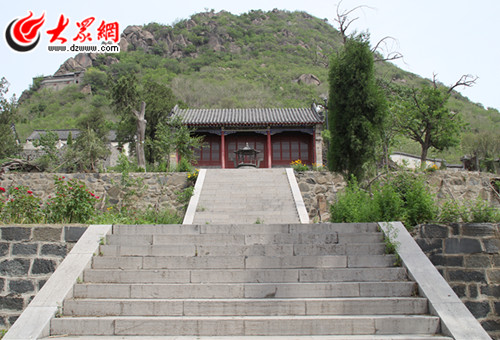
looking up at the
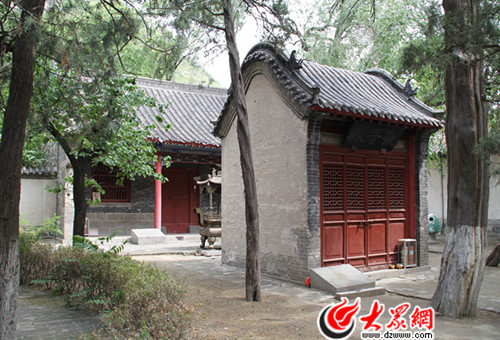
part of the palace of Taishan />

Hua Yang Palace front yard
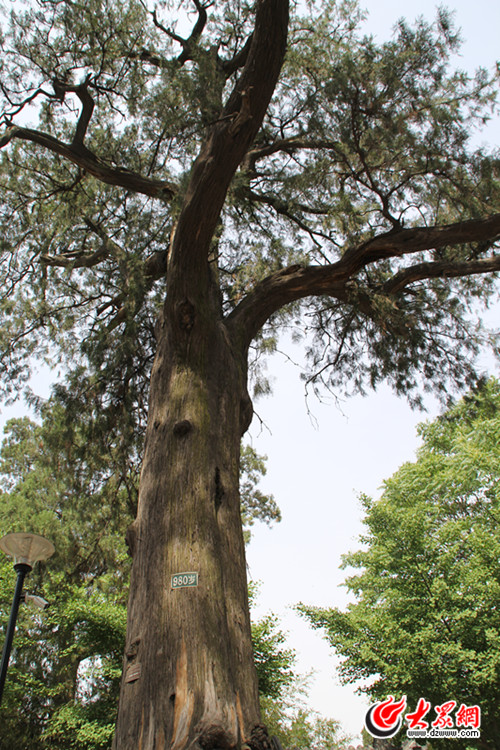
Millennium cypress
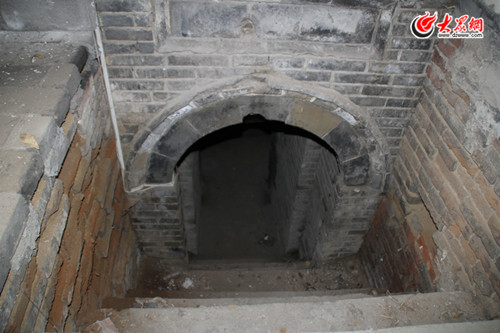
dark Palace of the Earth entrance
Inside the palace
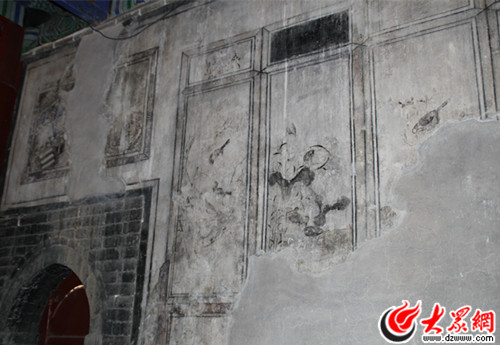
the mottled ancient murals in the hall,
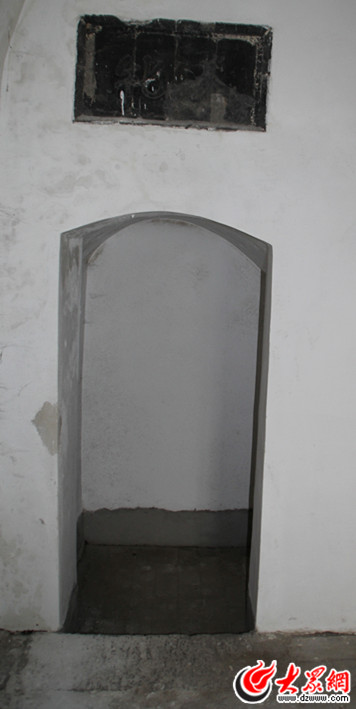
Zhu Zhi Jing: into the female
[b] / VW reporter Wang Yanan Zhang Na [/b]
In the Northeast suburb of Ji'nan, there is a famous historical mountain named Huashan, while Zuo Zhuan and SHUI JING ZHU are "Hua Bu Zhu". Throughout the ancient and modern times, countless literati poured their books into ink and ink, and Li Bai, "don't go to the mountains," said Shi Yun: "mountain He Junxiu, green jade like Hibiscus". As the old saying goes, there are many views in the famous mountains. There is a group of ancient temple buildings in China. They are not injected in the north and face to Huashan lake. The main buildings are the temple of the palace of Hua Yang, the palace of Taishan, the Guan Yu Temple and so on. Because Huayang palace has the largest scale and the longest history, it is customary to call this building group "Huayang Palace". The time is easy to turn, the dynasty is changed, the palace of Hua Yang has been standing quietly for thousands of years, and how many of the dust and dust are annihilated in the world, and how many historical marks remain in the view.
[b] view: Gu Feng Ying lake, lotus appearance group hall is surrounded by giant [/b]
Huashan is famous for its name, Hua Tong "flower", and this mountain is lonely. Before the Jin Dynasty, Huashan to Magpie mountain between a vast ocean, and Daming Lake, and Huashan stand off, beside the attached, in the water, such as lotus in the general, so named. Huayang palace is located in the south of Huashan. It is located on the mountain. All the palaces are scattered and orderly. They are the largest and longest historical buildings in Ji'nan. There are 17 temples in the palace, which are for the three emperors, the ten Dian Yama, the Ma Tou empress and other heavenly gods and Buddhas. The palace is numerous and the gods are different. The ancient people became the "Grand View of Ji'nan".
the old orchid bridge, the palace gate and the bell drum of the palace of Hua Yang have been leaning to the two floor of the palace. First, it comes to the palace by the weeds. First, it is a solemn and solemn palace. The four values of the Gong are standing on both sides of the palace, and the gods are different and vivid. The main hall of the palace is the four seasons hall, and the temple hall of loyalty and filial piety is on both sides. And located on both sides of the palace of huadang, they are the three imperial palace in the East and the pure soil nunnery on the west side, and then to the west, the larger Taishan palace, and the Jade Emperor's Palace on the north side of the palace of Huayang. The highest building in the whole building is the three yuan palace. The main hall is the three official hall for the official water officials of heaven. The layout of the entire architectural community is so ancient that it is a detached and empty spirit to listen to the wind in the smoke.
[b] see people: ancient wood thousands of years now still do not see the view of the man [/b]
from the two palace gate into the courtyard, 17 towering ancient cypress stand, each cypress has a brand of tree age, mottled iron card, the oldest one has been 998 years old. Two people embrace the trunk of the trunk straight, the lush pine needles are quite blot out of the sun, the tree planting position is wrong, thousands of years of age also hint at the long history of the palace.
in the long life of Huashan, this land has gone through the battle of Qi Jin during the spring and Autumn period. It is said that the Jin army was chased by the Jin army for "three weeks of China". The ugly father, who was in the same car with Qi Qing Gong, was taken captive by Qi Gong. Later, Qi Qing Gong rushed to the enemy camp and killed three out of three in order to save the ugly father. Now Huashan is surrounded by a vast expanse of peace, and the story of hegemony and hegemony is hard to understand.
the names of famous mountains and names always lead to the desire of the literati. The staff said that Li Bai and Su Shi had come to the palace of Hua Yang. They not only left the poems of poetry, but also said that the palace of Hua Yang was the place where Li Bai was home. "I swim in the past, and don't give the peak to China." Li Bai's poetry has been circulating until now, but I wonder if he really says in his poem that he takes the white deer and the dragon with the fairies.
[b] reading history: from Ji'nan to Huashan Huayang palace, the whole [/b]
Miyako Island building group of Hua Yang in the palace of Hua Yang is mainly Taoism, the Buddhism and Confucianism are involved, the folk religious culture has a very strong connotation, and the gods worship in the temple are closely related to the common social life of the people. Here, whatever psychological needs are, idols can be found in the Huayang palace complex. The rain seekers, the blessings, the forgiver, the calamities, the riches, the sons and the prayers. Everything is there, so there is also a saying that "coming to Ji'nan to Huashan, the fairy temple in Huayang Palace".
Li Tao, a famous folk scholar in Ji'nan, introduced the cotton hall and the three emperor hall in the building group of the Huayang palace. There are few in the whole country. The cotton God in the cotton palace, which prayed for the harvest of the crops for the ancient people, has been well known to the present. There are also ten rare temples such as the palace of the king, the hall of earth and so on.
most precious of all, the palace in the palace of the Huayang palace, painted with more than 550 square meters of ancient frescoes, is still mottled and heavy on the walls, although it is moving around the stars. The staff said that the interior painting of the Palace used folk custom techniques and patterns, and felt the wisdom and diligence of the ancient working people in the vaguely identified Qinglong and Danfeng. After going to three churches, the first stage of Confucianism, Buddhism, Taoism and three religions, the frescoes were still fresher. On the wall of the white wall powder, the rhyme of the murals is still clearer. It turned out that the mural was smeared in the period of the cultural revolution, and then it was able to resee the day after the repair of the experts. In addition, there are many inscriptions in the palace of Hua Yang. From the beginning of the yuan to the Republic of China, the history span is very long, but it is a simple account of the repairs and repairs, and the records of the Temple View regulation and the religious development are rarely seen.
cloudy mist steaming Hua not to note, wave sound earthquake Daming Lake. Natural scenery gives its unique charm, historical accumulation gives its immortal legend, when their posture gradually disappear in sight, you can also hear a thousand years of ancient view of the Buddha sigh, they come from the boundless history, will continue to disagree in the long river of time.
[b] disclosure: the "last man" in the palace of Hua Yang, [/b]
the highest three yuan palace in the palace of Huayang palace, a Palace of the Earth, and two to 90 degrees along the stone step. The Palace of the Earth in the temple of Taoist temple, most of the Taoist monk and monk monk closed the customs, has been the oldest for three years without combing, not easy to wear the haircut, until the emergence of the immortal or the silence. Entering the Palace of the Earth, the top of it is brick and stone arch, with large space and small windows and air holes. There are two gateways on the north side. They are "entering the female" and "coming out of the Xuan". On the west side of the south end, the door was opened, with a stone plaque called "Fairy Cave", which was inlaid in the thirty-one years of the Republic of China. These three words are the last Taoist of Huayang Palace - Zhu Zhijing's title.
it is rumored that Zhu Zhijing came to this Palace of the Earth later, and entered Palace of the Earth, and sat down in his diet. His apprentice came in from the beginning to send some drinking water, and then he would not be allowed to enter. Finally, Zhu Zhijing was found to be dead in the Palace of the Earth, and his body was just like a mud tire that sat on the wall, and did not realize his desired feathering. After that, his apprentice buried him at the foot of Huashan.
in the later period, a local farmer was divided into the land where Zhu Zhijing was buried. The farmer who coveted the burial product then dug the grave, but not the ordinary coffin but a coffin. At the opening of the jar, Zhu Zhijing was found to be dead in the cylinder, sitting in the cylinder, and there was no burial in the cylinder, and the farmer, with a hooked shovel, threw it out and threw it into a swamp in front of the palace of Hua Yang, and the last Taoist was disappearing in the vast swamps.
[b] last monk: shouting [/b]
according to historical records, the last monk Temple of the palace of Huayang palace, because of the prosperity of the fragrant fire in the palace of the Huayang palace. Shou Ting monk himself is not a true monk who is truly merciful. According to legend, a female disciple from Hebei came to the Huayang palace to burn incense. She did not want to be deceived by the shouting monk to Palace of the Earth.
mass network reporter came to the Palace of the Earth in the story. Unlike the three yuan Palace Palace of the Earth, the Palace of the Earth is more deep and concealed, steep and difficult, the whole step is almost 90 degrees, the bottom of the Palace of the Earth is dark, and the searchlights can be seen with a stone bed on the stairs, two arches on the west side, and steps under the arch. Go deeper into the ground. There were no windows and ventilated eyes, which were covered with cobweb and dust over the years. Their appearance was ghastly, and the temperature was very low because of the underground.
, at the end of the story, the girl's little uncle was a folk leader at that time. After the search, the eye line near Huashan said that it was lost in the palace of Hua Yang. Plus the nearby shouting monk's evil deeds, the woman's little brother-in-law came to rescue the woman and pushed the shouting monk to the palace gate, and lit the sky lantern for hatred.
[b] last nun: the pure soil nunnery in the building group of Zhen Xiu [/b]